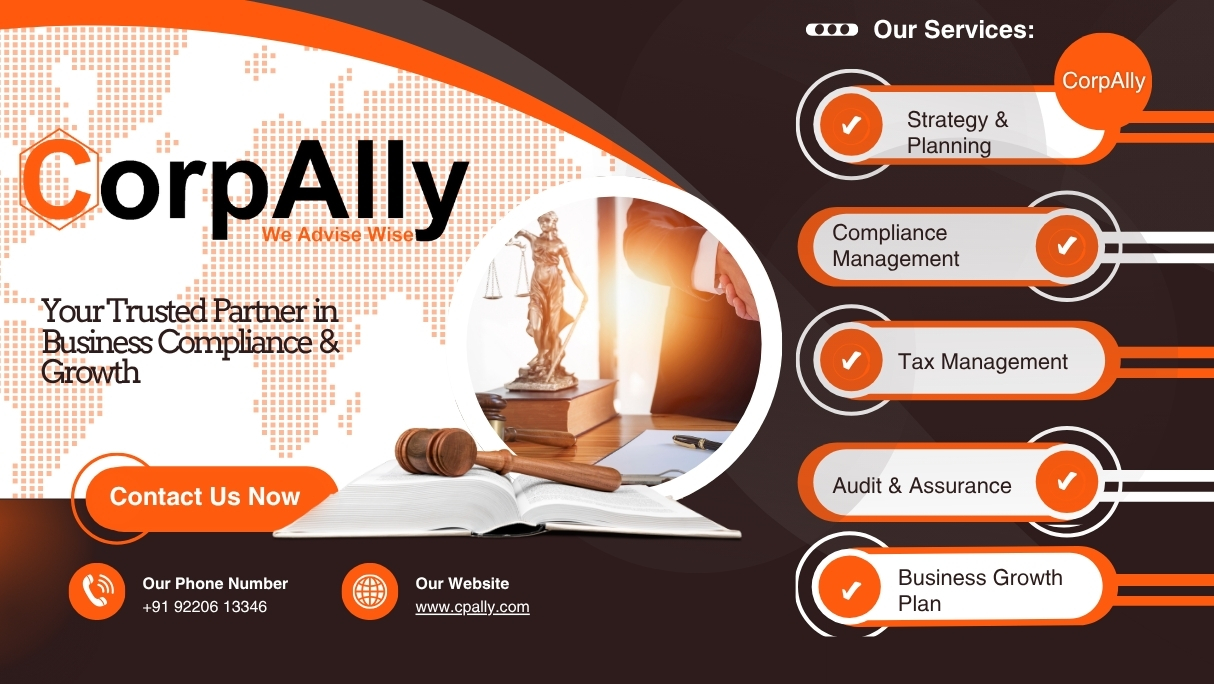Compliance Audits: Strengthening Governance and Legal Integrity

Strong 8k brings an ultra-HD IPTV experience to your living room and your pocket.
Introduction: Why Compliance Audits Matter Today
In today’s complex regulatory environment, businesses must ensure that their operations conform to applicable laws, regulations, internal policies, and industry standards. A compliance lapse, even unintentional, can result in legal penalties, reputational damage, or loss of investor trust. This is where compliance audits come into play.
Compliance Audits are systematic evaluations designed to assess how well a company adheres to external regulations and internal standards. Whether you're a startup, SME, or enterprise, audits are essential for verifying that every function — from HR to finance to operations — meets legal and regulatory benchmarks.
At CorpAlly, we offer comprehensive compliance audit services tailored to Indian business environments. We help organizations identify non-compliance, mitigate risks, and build a culture of accountability.
What is a Compliance Audit?
A compliance audit is an independent review to evaluate whether an organization is following external regulatory requirements and internal policies. These audits are crucial for industries with strict legal frameworks, such as finance, pharmaceuticals, manufacturing, and IT.
The audit involves document reviews, interviews, system checks, control evaluations, and reporting. It doesn’t just assess current practices—it recommends what to fix and how to stay future-ready.
Key Areas Covered in a Compliance Audit
A typical compliance audit reviews multiple facets of business operations, including:
1. Statutory Compliance
Verifies adherence to laws like:
Companies Act, 2013
Income Tax Act
Goods and Services Tax (GST)
Factories Act
PF, ESI, and labor regulations
2. Internal Policy Adherence
Audits whether employees, departments, and management follow established SOPs and internal governance policies.
3. Contractual Obligations
Checks compliance with terms laid out in vendor, partner, and employment contracts.
4. Environmental, Social, and Governance (ESG) Norms
Evaluates how business practices align with sustainability and ethical responsibility frameworks.
5. Data Privacy and IT Compliance
Assesses data handling protocols under laws such as India’s Digital Personal Data Protection Act or global standards like GDPR.
Why Compliance Audits are Crucial
✅ Avoid Legal Penalties
A missed filing or regulatory breach can lead to significant fines, prosecution, or suspension of licenses.
✅ Safeguard Reputation
A non-compliant company is seen as unreliable. Compliance audits help maintain public and stakeholder trust.
✅ Investor and Stakeholder Assurance
Investors, shareholders, and lenders look for evidence of governance before engaging with or funding businesses.
✅ Improve Operational Controls
Audits often uncover inefficiencies or misalignments that, when addressed, improve productivity and reduce risks.
✅ Support Decision-Making
Senior management benefits from audit reports that provide actionable recommendations backed by data.
How CorpAlly Conducts Compliance Audits
CorpAlly follows a structured and transparent audit methodology to deliver value-based outcomes:
1. Pre-Audit Planning
We assess the business model, regulatory landscape, and compliance scope to prepare a tailored audit checklist.
2. Document and System Review
We examine statutory records, filings, licenses, internal SOPs, and control frameworks.
3. Interviews and Fieldwork
Our auditors speak with relevant departments and test systems to validate adherence to protocols.
4. Risk Assessment
We identify compliance gaps and assess their potential legal, financial, and reputational risks.
5. Comprehensive Reporting
We present a detailed report with findings, risk ratings, and corrective action plans that are easy to implement.
6. Follow-Up Support
We don’t stop at reporting. CorpAlly supports implementation of corrective measures and offers re-audits if needed.
Industries That Need Compliance Audits
While every business benefits from compliance checks, certain sectors have a heightened need:
Financial Services: Due to RBI, SEBI, and AML regulations
Manufacturing & FMCG: Environmental norms, labor laws
Healthcare & Pharma: Drug licensing, bio-ethics, patient data laws
E-commerce: Data security, vendor contracts, tax laws
Startups & SMEs: Especially those looking to raise capital or go public
When Should a Company Conduct Compliance Audits?
Compliance audits should not be one-time events. Businesses should conduct them:
Annually or semi-annually (for dynamic industries)
Before M&A or fundraising rounds
After major regulatory updates
During internal restructuring or expansion
After receiving legal notices or regulatory scrutiny
By making audits a routine, organizations can stay ahead of enforcement actions and compliance shocks.
Common Compliance Audit Findings
Here are some issues that audits often reveal:
Late or missing statutory filings
Inadequate maintenance of registers and records
Unregistered software licenses
Poor documentation of contracts or SOPs
Gaps in employee labor law adherence
Incomplete tax compliance or reconciliations
Weak data protection or access control policies
Addressing these issues early can prevent severe consequences down the line.
How CorpAlly Adds Strategic Value
What sets CorpAlly apart in compliance audits?
Regulatory Expertise: Our team stays updated with the latest MCA, SEBI, RBI, and GST regulations.
Industry Experience: From startups to conglomerates, we’ve audited across verticals.
End-to-End Solutions: We offer compliance audit, gap analysis, legal advisory, and post-audit compliance support.
Risk-Based Auditing: We prioritize areas with higher exposure or historical lapses.
Ethical & Independent: We deliver objective assessments with full confidentiality and transparency.
FAQs About Compliance Audits
Q1: Are compliance audits mandatory?
They are not always legally required, but many industries mandate internal audits. Regardless, they are essential for maintaining legal and operational hygiene.
Q2: What documents are needed for a compliance audit?
Depending on your business, documents may include GST returns, labor law records, board meeting minutes, contracts, licenses, and HR records.
Q3: How long does a compliance audit take?
Typically, 2–4 weeks depending on the size, industry, and complexity of operations.
Conclusion: Secure Your Business Future with Compliance Audits
Compliance is not just about avoiding penalties—it’s about building a business that is respected, reliable, and ready for growth. A proactive compliance audit helps identify vulnerabilities, streamline operations, and prepare your organization for long-term sustainability.
With CorpAlly’s compliance audit services, you gain a strategic partner that ensures you're never caught off guard. We empower your business with clarity, compliance, and confidence—so you can focus on what you do best: growing your enterprise.
Note: IndiBlogHub features both user-submitted and editorial content. We do not verify third-party contributions. Read our Disclaimer and Privacy Policyfor details.


